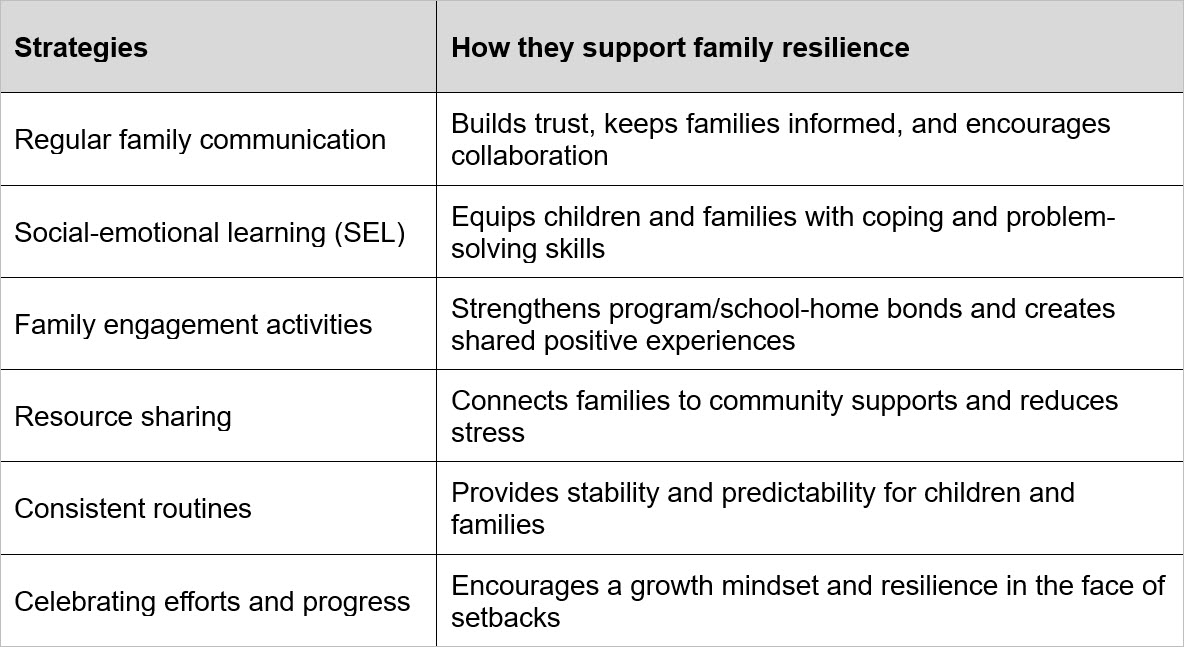
By Rudee Robertson | April 22, 2025
Family resilience – the ability of families to adapt, recover, and grow stronger through adversity – is vital for child well-being and academic success. Teachers, as key partners in a child’s development, play a crucial role in supporting and strengthening family resilience. Teachers can make a meaningful impact in a variety of ways.
Foster strong teacher-family partnerships
- Build positive, trusting relationships with families through regular, open communication. This includes sharing both children’s successes and challenges and inviting families to participate in program activities and decision-making.
- Encourage family involvement in the program/classroom, which helps families feel valued and supported, and strengthens the home-program connection.
Promote emotional well-being and social-emotional skills
- Teach and model emotional regulation, problem-solving, and positive self-talk in the classroom or care setting. These skills not only help children cope with challenges but can be shared and practiced at home, benefiting the entire family.
- Create a safe, non-judgmental space for children to express their feelings, which encourages open emotional expression within families as well.
Provide consistency, structure, and clear expectations
- Establish predictable routines and clear expectations in the classroom or care setting. This sense of stability can be mirrored at home, helping families develop routines that foster security and resilience.
- Share strategies with families for setting positive limits/boundaries, maintaining routines, and reinforcing positive behaviors at home.
Empower families with resources and support networks
- Connect families with community resources, support groups, and mental health services when needed. Teachers can serve as a bridge to these supports, reducing isolation and stress for families.
- Encourage families to build their own support networks, both within the program/school community and beyond, to strengthen their resilience during difficult times.
Encourage a growth mindset and celebrate effort
- Reinforce the value of effort, perseverance, and learning from mistakes, both in the classroom/care setting and in communication with families. This helps families adopt a growth mindset, viewing challenges as opportunities for growth.
- Celebrate not just academic achievements, but also resilience, adaptability, and progress, both for children and their families.
Model resilience and collaboration
- Demonstrate resilience in your own professional practice by adapting to challenges, seeking support, and maintaining a positive outlook. When teachers model these behaviors, families are more likely to adopt similar approaches at home.
- Collaborate with families as co-teachers, recognizing their expertise and insights into their children, and working together to support child and family well-being.
Teachers are uniquely positioned to support family resilience by fostering strong partnerships, promoting emotional well-being, providing structure, and connecting families to resources. By working collaboratively with families and modeling resilience, teachers help create a support ecosystem where children and their families can thrive, adapt, and grow stronger together.
Sources
- https://pmc.ncbi.nlm.nih.gov/articles/PMC11939180/
- https://whytry.org/how-schools-can-support-parent-involvement-and-increase-resilience-in-the-home/
- https://www.sedonasky.org/blog/resilience-guide-for-parents-and-teachers
- https://www.teachermagazine.com/au_en/articles/classroom-strategies-for-building-resilience
- https://www.kidsfirstservices.com/first-insights/building-resilient-families



